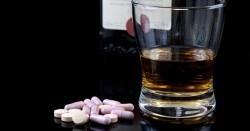Dangers of Mixing Vicodin and Alcohol
According to the Centers for Disease Control, mixing alcohol and opiates like Vicodin is extremely dangerous. Many of the overdose deaths each year are due to mixing Vicodin and other opiates with alcohol. There are some specific dangers when you mix these two drugs.
What Happens when you Mix Alcohol with Vicodin?
When you drink alcohol and take Vicodin the effects of both drugs are exaggerated. Doctors call this reaction synergism. It means that the person taking the drug feels both the effects of alcohol and the effects of the other drug, only effects are a lot more intense. Since alcohol and Vicodin are synergistic, the combination of the two may prove to be lethal. The person taking both drugs feels the effects of each drug more severely than if they just took one or the other.
Effects of Vicodin
The effects of Vicodin that are increased by the consumption of alcohol are:
- dizziness,
- lightheadedness,
- drowsiness,
- difficulty breathing,
- changes in heart rate,
- anxiety,
- nausea,
- vomiting,
- mood changes, and
- headache.
These are not all the effects of Vicodin, only the ones that alcohol impacts.
Effects of Alcohol
Although almost everyone knows what the effects of alcohol are, you might not know which of these effects specifically reacts with Vicodin. These are:
- nausea and vomiting,
- slowed respiration,
- dizziness,
- confusion,
- lowered inhibitions,
- mood changes,
- headache,
- changes in heart rate, and
- anxiety.
Most of these effects are relatively common with even just a few drinks.
Combined Effects

Mixing Vicodin and alochol can cause drowsiness and dizziness.
According to the National Institute on Alcohol Abuse and Alcoholism, the combine effects of alcohol and Vicodin are:
- drowsiness,
- dizziness,
- slowed breathing,
- difficulty breathing,
- slowed heart rate,
- unusual or bizarre behavior,
- slowed reactions,
- lowered inhibitions,
- decreased motor control,
- memory problems,
- severely increased risk of overdose,
- coma, and
- death.
All of these combine effects are extreme and sometimes fatal. Many people fall into the trap of drinking while on medications like Vicodin. Since Vicodin stays in your system for a very long time, taking it and then going out and drinking later is what causes many of the problems people experience.
What are the Risks of Mixing Vicodin with Alcohol?
There are also risks to mixing Vicodin and alcohol. These risk range from simple to extremely dangerous. These risks are:
- lowered inhibitions – with you inhibitions lowered you tend to engage is high risk behaviors like risky sex and driving while under the influence,
- confusion – it is difficult to function and be aware of environmental dangers when you are on Vicodin and alcohol together.
- slowed breathing – similar to an overdose of just Vicodin, the combine effects of alcohol and Vicodin can slow your breathing to the point where you become oxygen deprived.
- overdose – taking Vicodin with alcohol can intensify the effects of Vicodin. All of the negative side effects are amplified. Taking your normal amount of Vicodin with alcohol can cause a fatal reaction.
Fortunately, there is help for those with an addiction to Vicodin and an addiction to alcohol. Most treatment centers are equipped to help with dual addictions. For more information on addiction treatment services call us at, 1-800-854-3274.
 Similarities Between Opium & Heroin -
Heroin and opium are very similar, and share common effects. Heroin is made from opium, however, and is used in a different manner than opium.
Similarities Between Opium & Heroin -
Heroin and opium are very similar, and share common effects. Heroin is made from opium, however, and is used in a different manner than opium.  Opiate vs. Opioid – What’s the Difference? -
While it is common to use opioid and opiate interchangably, there are differences between the two. Determining opiate vs. opioid has to do with if the drug is natural or synthetic and what effects it has on the body.
Opiate vs. Opioid – What’s the Difference? -
While it is common to use opioid and opiate interchangably, there are differences between the two. Determining opiate vs. opioid has to do with if the drug is natural or synthetic and what effects it has on the body.  What does Heroin Look Like? -
Learn about the appearance of different types of heroin.
What does Heroin Look Like? -
Learn about the appearance of different types of heroin.  Potential Dangers of Vicodin -
Two of the main dangers Vicodin carries are addiction and overdose. It is important to take any Vicodin prescription carefully, and to never misuse it.
Potential Dangers of Vicodin -
Two of the main dangers Vicodin carries are addiction and overdose. It is important to take any Vicodin prescription carefully, and to never misuse it.  Is Heroin an Opiate? -
Heroin is a highly addictive and dangerous illicit drug that is derived from morphine.
Is Heroin an Opiate? -
Heroin is a highly addictive and dangerous illicit drug that is derived from morphine.